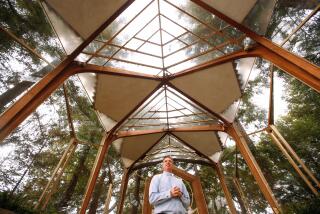Gospel to Go : At a Truck Stop in Ontario, a Chapel Offers Big-Rig Religion for Drivers Rolling Through Town
- Share via
Here at Truck-Stop Jesus, a 40-foot trailer that has been converted into a church, there is “only one on-ramp” to “God’s highway of life.”
*
There also is a selection of Jesus mud flaps, bolo ties and--for truckers with tape decks--”Singing Truck Driver” cassettes.
Chaplain Ken Taylor stands near the door, looming large in his size 12-triple-E boots and permanent-press Wrangler slacks. Taylor, 56, drove big rigs 30 years before coming to Southern California in 1992 as an evangelist with Transport for Christ International, an organization that operates truck-stop chapels in Moscow, Canada and the United States.
It’s an unusual ministry--but not a unique one. In the U.S. alone, no fewer than 43 groups cater to tractor-trailer drivers, according to the Illinois-based Assn. of Christian Truckers.
But Taylor’s chapel, parked at a Unocal truck plaza off Interstate 10 in Ontario, apparently is the only permanent trucker church in the L.A. area.
“We’re just here to listen to problems,” says the leathery-skinned chaplain, a Texas native who took two years of Bible school to join Transport for Christ. “Most truckers are away from home four to eight weeks at a time, they’re lonely and they (often) have family problems because they’re gone so long.”
They also have trouble attending traditional churches because their rigs are usually banned from local streets and parking lots too weak to sustain the weight.
Taylor, his wife, Martha, and several part-time assistants try to fill the gap with daily services, walk-in counseling, screenings of inspirational videotapes and friendly conversation.
“It’s my home away from home,” says Dan Bence, a chapel regular who drives frozen foods and other cargo out of Kaysville, Utah. “You just come in, hang out, have a good time and listen to the word (of God). . . . It’s a nice break” from listening to drivers shoot the breeze over CB radio.
Another regular is retired driver Marvin Shire of Ontario, who likes to shove a small harmonica into his mouth, put his hands behind his back and play “Oh, Susanna.”
But most chapel visitors are never seen again. Such as the teen-age girl, riding with her lapsed-Catholic father, who ducked in to pray for a safe trip back to Texas. Or the trucker who spent the afternoon making balloon animals. Or the hopelessly lost woman who said she left Ontario three days earlier and wanted to know where she was now.
“When the door opens,” Martha Taylor says, “you never know who’s going to walk in.”
*
Transport for Christ--the grand-daddy of Christian trucking ministries--began 42 years ago in Canada with a hitch-hiking evangelist named Jim Keys. A former trucker who steered his first rig at age 13, Keys experienced a religious conversion at 20 and started thumbing the highways, sharing his faith with any trucker who would pick him up.
“No one was reaching the drivers at that time,” he says.
Later, he bought an old Nash station wagon, dug up a 16-millimeter film about big-rig safety, then drove from truck stop to truck stop, showing the film and evangelizing. In 1966, he moved his organization to the United States and assembled the first 18-wheel chapel.
In the mid-1970s, he broke from that group to found the charismatic Assn. of Christian Truckers, which emphasizes speaking in tongues and other “gifts of the Holy Spirit.”
Transport for Christ, meanwhile, continued its mobile ministry unchanged until 1987, when a Pennsylvania truck-stop owner asked for a permanent chapel. The manager of the stop had detected a decline in prostitution and drug dealing whenever TFC trucks rolled into the parking lot and wanted one on the premises ‘round the clock.
Today, TFC operates chapels at 14 truck stops--mostly in the Northeast--and hopes to have 100 in place by the end of the decade. The goal is to make sure no driver is ever more than half a day from a TFC church, says spokesman Randy Fontaine.
Money and staffing, however, could mess up the timetable.
Converting a trailer into a chapel--complete with air conditioning, TV, bed, microwave and outside electrical cross made from big-rig-style orange parking lights--costs $15,000-$20,000, Fontaine says. Utility bills, religious tracts and other operating expenses run another $8,000 a year.
TFC picks up most of the tab, but chaplains are on their own for salary and living allowances. “It’s scary,” says Taylor. “I don’t like asking for donations because so many (preachers) on TV are taking money falsely right now and I don’t want to be caught up in that. . . . But the Lord provides.”
*
At dusk, Taylor climbs out of the trailer and asks truck-stop employees to announce his evening service over the PA system. Half an hour later, the drivers begin wandering in. “We get anywhere from zero to 29,” Martha Taylor says. Tonight, six show up.
Shire is there, with his bag of harmonicas. So is Frank Paul of Missouri, who converted three days earlier and now wants to know whether Adam and Eve’s sons had to marry their own sisters to have children.
The tiny congregation sings, reads from the New Testament (“The Road Map of Life” in trucker parlance) and listens to a short sermon.
Later, Taylor hands out “Bible Study No. 1,” a small yellow pamphlet that says “God is the perfect dispatcher” and truckers should be “haulin’ the right load” if they want to spend eternity “at our heavenly terminal.”
There are also temporal benefits to riding with the Lord, Taylor says: “He’ll send his angels down . . . (and) we won’t have all these troubles with the scales and the highway patrolmen because we’ll be flowin’ in love.”
He says about 300 people come through his chapel each month. Nationwide, the average is lower--200 visitors monthly. Of those, 2% to 4% convert to Christianity, Fontaine says. Many others already believe.
The Ontario chapel has logged 90 “decisions for Christ” since opening in February, 1992, including a motorist whose engine curiously wouldn’t start until he came into the chapel and accepted Jesus as his savior.
“I don’t know if it was coincidence or some kind of miracle,” Taylor says.
“But I believe God brought him here.”
More to Read
Sign up for Essential California
The most important California stories and recommendations in your inbox every morning.
You may occasionally receive promotional content from the Los Angeles Times.













